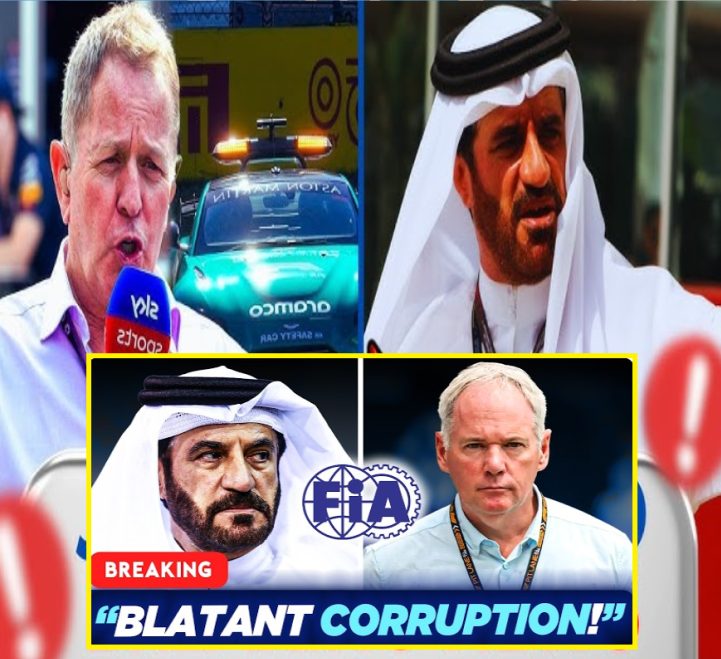Mercedes Cheating DRAMA: DAS 2.0?! 😳
Formula 1 has always been a sport full of high stakes, precision engineering, and a fierce battle for the top spot. But every now and then, drama erupts in the paddock that sends shockwaves through the motorsport world. Recently, Mercedes has once again found itself in the spotlight, with whispers of a potential scandal involving a new version of their controversial DAS system. Could Mercedes be on the brink of another cheating scandal? Let’s break down the situation and explore whether DAS 2.0 is real and what this means for the sport.

A Brief History of DAS: The Original Controversy
To understand the gravity of the situation, we need to rewind to 2020, when Mercedes introduced the “Dual-Axis Steering” (DAS) system. It was a game-changing innovation that allowed drivers to adjust the angle of the front wheels using the steering wheel, effectively altering the aerodynamics of the car during a race. This gave Mercedes a significant advantage, especially in terms of tire management, as the system allowed drivers to heat their tires up quickly during formation laps or during periods of the race when tire temperatures were an issue.
However, the system wasn’t without controversy. While Mercedes insisted that DAS was within the regulations, many in the paddock were skeptical. The FIA ultimately decided to ban the system after the 2020 season, deeming it too innovative and potentially circumventing the spirit of the technical rules. The decision was a huge blow to Mercedes, who had hoped to retain the system for the 2021 season.
The Whisper of DAS 2.0
Fast forward to 2024, and it appears that Mercedes might be back at it again. Rumors have surfaced that the team has developed a new version of the DAS system—let’s call it DAS 2.0—that could give them a similar, if not greater, advantage over their rivals. This version reportedly works differently from the original DAS, but the goal remains the same: to optimize tire performance and gain a strategic edge during races.
While the specifics of DAS 2.0 are still unclear, the buzz in the paddock is that Mercedes has found a way to sidestep the rules and bring back a system that could mimic the benefits of the original DAS. Sources claim that this new system might involve subtle tweaks to the car’s steering or suspension systems, potentially exploiting a loophole in the current regulations that the FIA has not yet addressed. If true, this could lead to another round of accusations and investigations into whether Mercedes is pushing the limits of the rules once again.
The Impact on the F1 Community
If the rumors are true, Mercedes could find itself in hot water with the FIA once again. The 2020 DAS controversy still looms large, and any repeat of such a scandal would only fuel suspicions that the team is willing to bend the rules for a competitive advantage. While Mercedes has always maintained that their innovations are within the bounds of the regulations, the introduction of a “DAS 2.0” could reignite debates about the sport’s technical regulations and the need for clearer, stricter guidelines.
Other teams, particularly those in direct competition with Mercedes like Red Bull and Ferrari, are sure to scrutinize the situation closely. If Mercedes is found to be exploiting another loophole or bending the rules, it could lead to calls for penalties or even disqualification, as happened with Ferrari’s engine controversy in 2019. The fallout from such a scandal would not only tarnish Mercedes’ reputation but could also spark a wider discussion about fairness and transparency in F1.
The FIA’s Response: Will They Act Again?
One of the key questions surrounding DAS 2.0 is how the FIA will respond if they discover that Mercedes has developed another system similar to the original. The governing body has shown a willingness to act swiftly when teams push the boundaries of the rules, as seen with the DAS ban in 2020 and the scrutiny placed on other teams’ innovations over the years. The FIA will likely be on high alert for any signs that Mercedes is once again testing the limits of the regulations, especially after the controversies surrounding DAS 1.0.
However, given the constant evolution of F1 technology, it’s possible that the FIA may take a more measured approach, carefully evaluating whether the new system truly violates the rules or simply represents a clever adaptation within the allowed framework. Either way, the FIA will have to act quickly to maintain the integrity of the sport and ensure that all teams are operating on a level playing field.
What’s Next for Mercedes?
For Mercedes, the pressure is mounting. If DAS 2.0 is real, the team could once again be on the receiving end of intense scrutiny from both the FIA and their rivals. The team has already faced criticism over its dominance in recent seasons, and any new accusations of rule-bending could only intensify that scrutiny. However, Mercedes has long been known for its innovation, and if they have indeed found a legitimate loophole or a new technical advantage, they will likely defend their approach, just as they did with DAS 1.0.
Mercedes’ performance in the coming races will be closely watched, especially in light of these rumors. If the team is able to maintain its competitive edge without drawing suspicion, it could continue to dominate. But if DAS 2.0 becomes a confirmed reality, the fallout could be significant, both for Mercedes and for the reputation of F1 itself.
Conclusion: A New Era of Innovation or Another Scandal?
As the 2024 season unfolds, all eyes are on Mercedes and the potential return of DAS in a new form. Whether DAS 2.0 is a legitimate innovation or another attempt to push the boundaries of the rules remains to be seen. However, if Mercedes is caught bending the rules once again, it could spark another massive controversy in the world of Formula 1. For now, the mystery remains, and fans are eagerly awaiting what could be the next chapter in one of F1’s most fascinating technical dramas. Will Mercedes triumph with a new advantage, or will they face the music once again for another scandalous innovation? The story is far from over.





